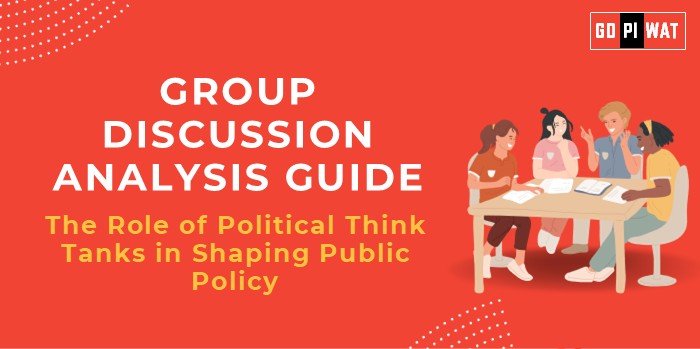📋 Group Discussion (GD) Analysis Guide
🌐 The Role of Political Think Tanks in Shaping Public Policy
🌟 Introduction to the Role of Political Think Tanks
- ⚖️ Opening Context: Political think tanks are integral to modern governance, acting as idea incubators that influence public policies worldwide. Their insights are pivotal in tackling economic, social, and political challenges.
- 📜 Topic Background: Think tanks such as the Brookings Institution in the U.S., the Observer Research Foundation (ORF) in India, and Chatham House in the U.K. have shaped pivotal policies through research and advocacy. Their importance is growing with the increasing complexity of governance and global interconnectivity.
📊 Quick Facts and Key Statistics
- 🌍 Global Count: Over 8,200 think tanks exist worldwide, with India housing over 200. (Significance: Reflects their widespread influence in policy-making.)
- 📈 Policy Impact: 78% of policy-makers globally consider think tanks a key source of ideas. (Significance: Highlights their credibility.)
- 💰 Funding: The global think tank sector is worth $6 billion annually. (Significance: Demonstrates their financial robustness.)
- 🇮🇳 India’s Role: India ranks third globally in the number of think tanks, after the U.S. and China. (Significance: Underscores India’s growing thought leadership.)
🤝 Stakeholders and Their Roles
- 🏛️ Governments: Leverage think tanks for evidence-based policymaking.
- 🏢 Private Sector: Collaborate with think tanks for sector-specific insights.
- 🎓 Academia: Provides intellectual frameworks for think tanks’ research.
- 🌍 Civil Society: Engages in advocacy based on think tanks’ findings.
🏆 Achievements and Challenges
✨ Achievements:
- 📈 Influenced key policies like India’s Atmanirbhar Bharat initiative (ORF’s role).
- 🌍 Fostered global dialogue on issues like climate change (Chatham House’s work).
- 🤝 Created platforms for multi-stakeholder engagement (e.g., Raisina Dialogue).
⚠️ Challenges:
- ❌ Funding biases potentially skew research outcomes.
- ⚖️ Limited diversity in representation among experts.
- ⚡ Influence constrained by political resistance in certain regions.
🌎 Global Comparisons:
- ✔️ The Brookings Institution’s role in U.S. welfare reforms.
- ✔️ China’s think tanks, like the Development Research Center, influencing global trade policies.
💡 Structured Arguments for Discussion
- ✔️ Supporting Stance: “Think tanks bridge the gap between academia and governance, providing actionable insights critical for robust policy-making.”
- ✖️ Opposing Stance: “Funding dependencies often compromise think tanks’ objectivity, limiting their impact.”
- ⚖️ Balanced Perspective: “While think tanks have shaped key policies, concerns about biases and inclusivity must be addressed for holistic progress.”
🗣️ Effective Discussion Approaches
- 🎯 Opening Approaches:
- 🌍 “The growing influence of think tanks, with over 8,000 globally, demonstrates their relevance in shaping modern governance.”
- ❓ “Think tanks are the unsung heroes of public policy, but their increasing commercialization raises critical questions.”
- 💬 Counter-Argument Handling:
- Acknowledge funding bias and propose solutions like regulatory oversight.
- Present successful, unbiased case studies to highlight achievements.
🔍 Strategic Analysis of Strengths and Weaknesses
- 💪 Strengths: Access to diverse expertise, global reach and influence.
- ⚡ Weaknesses: Funding-related biases, lack of grassroots connection.
- 🌟 Opportunities: Technological advancements for better research, increased public-private partnerships.
- ⚠️ Threats: Political interference, erosion of credibility due to biased outputs.
📚 Connecting with B-School Applications
- 📖 Real-World Applications: Think tanks’ roles in data analysis, policy implementation, and stakeholder coordination directly align with MBA projects in strategy and operations.
- 🎓 Sample Interview Questions:
- ❓ “How do think tanks impact governance in developing countries like India?”
- ❓ “Discuss the challenges think tanks face in maintaining neutrality.”
- 💡 Insights for B-School Students:
- Importance of unbiased data analysis.
- Networking opportunities with industry leaders via think tanks.


